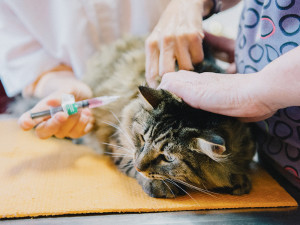Can Humans Get Cats Sick? What Science Says
What about the other way around?

Share Article
In This Article:
Can Cats Get Sick From Humans? What Diseases Can Humans Transmit to Cats? Can Humans Get Sick From Cats? What Diseases Can Cats Transmit to Humans? How to Help Keep Your Cat from Getting Sick Frequently Asked Questions
Humans can transmit some diseases – including influenza and MRSA (Methicillin-resistant Staphylococcus aureus) — to cats. The good news is that these kinds of human-to-cat transmissions are quite rare. Regardless of how your cat got sick, it is always important to practice good preventative health measures and have them examined by a vet whenever they seem unwell. Read on to learn more about the transmission of diseases between humans and cats.
Humans can get cats sick from time to time, but the good news is that this is not usually a problem for cats and their human families. The most common illnesses in cats do not come from humans, so if your kitty is sick, it is more likely that they got sick from a source other than you.
However, there are a handful of conditions that humans could spread to their cats, as well as some that cats can spread to humans. It is helpful to be aware of these conditions and take precautions as needed.
How much do you spend on your pet per year?

Can cats get sick from humans?
Luckily, there are not too many illnesses cats can get from humans, and even when it is possible, it is not often probable that your cat will get sick from you or someone else in your home. This is because germs that are transmissible from humans to cats may not be as well adapted to cat hosts, and cats may be more resistant to these infections. They may not have any symptoms at all, or only mild symptoms as a result.
Sometimes, cats can be asymptomatic carriers, meaning that if they are tested, they will show up positive for the condition, but they do not have an active infection. All of this can complicate the answer as to whether or not they actually got sick from you, versus simply being exposed to certain germs in your household.
In other cases, it’s often not clear whether a cat was the primary source of an infection that then spread to their humans, or the other way around. The bottom line is that this is a pretty unusual phenomenon for the most part. The best steps to take are good preventative measures to keep everyone healthy and to seek veterinary attention anytime you are concerned about your cat’s health.
Can cats and humans get the same sickness?
There are many bacterial, viral, and parasitic infections that affect both humans and cats. Sometimes, the exact same infectious agent can live in humans and cats, but other times, there is a variation between the exact species that infects humans versus cats. So, while cats and humans do get some of the same illnesses, they are not always transmissible between species.
In most cases, they are not able to spread from humans to cats or vice-versa. There are also some situations where both a human and a cat can get sick from the same source, such as if they were both to eat contaminated food or drink contaminated water, but they would not be able to spread the illness directly to other humans or cats. Then there are those infectious agents that can actually spread from humans to cats or cats to humans.
What diseases can humans transmit to cats?
There are not too many reports of diseases spreading from humans to cats, so this is not a major concern for most pet parents. In some of these cases, cats may test positive on specific diagnostic tests but are not necessarily acting sick or showing any symptoms. This list includes:
Influenza
The virus that causes the flu in humans is most commonly Influenza A strains H1N1 and H3N2. While there are reports of cats testing positiveopens in new tab for these viruses, they rarely show serious clinical signs of illness. There have also been reports of cats testing positive for Avian flu, H5N1. None of these cases traced the source of infection to a human specifically, so while it is theorized that cats may get infected from humans in their home, they may also be getting infected directly from wildlife, like birds.
MRSA
Methicillin-resistant Staphylococcus aureus (MRSA) is a strain of bacteria known to be resistant to many common antibiotics. Some healthcare professionals are carriers of this bacteria due to their exposures in the healthcare setting. Patients who undergo invasive medical procedures and/or have compromised immune systems are most at risk for these kinds of infections.
There have been documented cases of both humans and their petsopens in new tab, including cats, testing positive for MRSA within the same household, so it is possible for the bacteria to spread between humans and cats. This does not mean that they automatically get sick from the bacteria, but they may have the bacteria on their skin or in their body. The risk with this is that if they have a wound, need surgery, or have a compromised immune system, they could be more at risk for developing an antibiotic-resistant bacterial infection. In many cases, healthy pets will clear the bacteria from their system over time.
Ringworm
Ringworm is actually a fungal infection of the skin caused by a fungus known as a dermatophyte. Fungal spores are highly contagious and can spread from one animal to another, from animals to humans, or humans to animals via direct contact. In humans, ringworm causes a ring-shaped rash on the skin, while in cats it tends to cause scaly, scabbed areas of skin with hair loss.
Can cats catch COVID from humans?
Yes, it is possible for cats to become infected with the virus from humans and cats may show signs of illness when they are infected such as fever, difficulty breathing, vomiting, diarrhea, loss of appetite and/or lethargy. Some cats can also be infected but not have any clinical signs whatsoever.
Can humans get sick from cats?
Humans can get sick from cats as well. This is especially common when humans interact with outdoor cats or stray cats that have not received routine preventative care. It can also happen with indoor cats although this is not as common. Many of the infectious agents that cause illness in cats and are then transmissible to humans are the result of eating live prey or undercooked meat, or becoming infected with pathogens that are preventable with routine veterinary care.
Not every cat carrying these pathogens looks obviously sick, so it is important to handle all stray cats carefully and take precautions to practice good hygiene. On the other hand, not every sick cat has a disease that is contagious to humans so don’t let those risks stop you from bringing in that sneezing stray kitten and nursing it back to health. Just take precautions and get them checked out by a vet first.
What diseases can cats transmit to humans?
Cats can transmit a number of diseases to humans; however, many of these are uncommon and are not a big risk for most pet parents. For completeness, this includes:
Rabies
Rabies is a viral infection that can infect humans and many other mammals. It is typically spread through bite wounds from an infected animal. In the United States, rabies is most common in wildlife, including raccoons, foxes, bats and skunks, but it can also infect cats in rare cases. Luckily, there is a very effective vaccine against rabies and cats who are vaccinated routinely are protected against rabies and therefore cannot spread it to humans.
Toxoplasmosis
Toxoplasma is a parasite that cats may get from eating certain prey or raw meats. The parasite has a complex lifecycle, and cats are their permanent hosts. Most cats don’t have any signs of infection, but they can shed the eggs of the parasite in their poop. It takes up to five days for eggs to become infectious and then, if they are ingested by another animal, they can settle in with their new host.
Toxoplasma is a risk to pregnant women, as it can cause serious complications to a fetus, as well as to immunocompromised people. If the litter box is cleaned daily using good hygiene practices, it is unlikely for humans to be infected because there is a delay of up to five days before the eggs become infectious.
Salmonella
Cats can get sick from the bacteria Salmonella if they eat live prey or undercooked meat. They may not have any symptoms despite being infected, but they can pass the bacteria along to humans through their saliva and/or poop.
Ringworm
This is a fungus that can cause skin infections in both humans, cats, and other mammals. While humans can occasionally spread ringworm to cats, it is far more common for cats to spread ringworm to humans.
Stray cats, especially kittens, who may have weakened immune systems and inadequate nutrition are at risk for ringworm infections which can then be passed along to other animals and/or humans they come into contact with. Luckily, this infection is usually mild and easily treated in both cats and humans.
Intestinal parasites
Cats that hunt or live outdoors are often infected with intestinal parasites including roundworms and/or hookworms. Each intestinal parasite has its own lifecycle and forms of transmission. Some of these intestinal parasites can infect humans if they come into contact with an infected cat’s poop.
Plague
This is in fact a real disease that still exists and wasn’t just limited to the Dark Ages. Yersinia pestis is the bacteria that causes plague and is most commonly spread by infected fleas, who then bite rodents. Cats that eat infected rodents can also become sick and spread the disease to humans.
Tularemia
This is a highly infectious disease caused by the bacteria Francisella tularensis. This bacteria can be spread by ticks and deer flies. Infected animals can also spread it to humans. Rabbits, prairie dogs, hamsters, and cats have all been documented to cause infections in humans.
Cat scratch fever
This is an infection caused by the bacteria Bartonella henselae, which may be found in the saliva of some cats as well as in fleas. While many cats carrying the bacteria may be asymptomatic, if an infected cat bites or scratches a human, they can develop a swollen and painful wound along with fever, joint pain, and lethargy.
How to help keep your cat from getting sick
Whether your goal is to keep your cat from getting sick from you, preventing your cat from getting you sick, or just keeping your cat healthy and living their best life, there are steps you can take. Much of this involves practicing good hygiene, staying on top of your cat’s routine preventative health care and check-ups, and avoiding certain risky behaviors. This includes:
Washing your hands
This is always good advice, but be especially vigilant when you are sick to avoid spreading germs to your housemates, whether they have two or four legs.
Avoiding contact with your cat’s mucous membranes
Mucous membranes are areas where many germs can sneak into the body, including the mouth, nose, and eyes. If you are sick, try not to touch your cat in these places and try to prevent your cat from licking you to avoid transmission of certain germs.
Wearing a mask
It may feel silly to wear a mask around your cat, but if you are worried that you may have an airborne illness that could infect your cat, wearing a mask can cut down on transmission and keep your kitty safe.
Social distancing
If you have a clingy cat, having any form of separation from each other may seem like an impossible task, but it may keep your cat from getting sick from you. This can include avoiding face-to-face snuggles and even sleeping in the same bed for the most contagious period of your illness. Of course, you have to weigh the real risks of your cat getting sick against the struggle of convincing your cat to distance from you in any way.
Practicing good preventative care
Be sure to keep up with your cat’s routine vaccinations, dewormings, and flea and tick preventatives to avoid many preventable diseases. Your vet may recommend additional preventative treatments depending on where you live and your cat’s specific risks. All cats should have a veterinary check-up at least once a year.
Keeping cats indoors
Many illnesses can also be prevented by keeping cats indoors. They will not come into contact with wild animals that can transmit diseases to them, and they will also be protected from injuries like car accidents and attacks from other animals.
Preventing your cat from eating live prey or raw meat
While it is tempting to want to feed into your cat’s wild side, cats that eat live prey or raw- meat diets are at risk for many infectious diseases. These can not only make your cat sick but then your cat can also spread the infection to humans in the home.
FAQs (People also ask):
How can I tell if my cat is sick?
Many times, you can tell when your cat is sick because they will show signs including a decreased appetite, lethargy, hiding, vomiting, diarrhea, sneezing, coughing, or difficulty breathing. If your cat is showing serious signs of illness, it’s always important to see a vet right away.
When should I take my sick cat to the vet?
It is always better to play it safe and see a vet if you have concerns about your cat. In general, any time your cat is acting “off,” or there are changes in their behavior, appetite, and/or obvious signs of illness or injury, a vet should check them out.
Can cats tell when their humans are sick?
Cats become experts on their human’s routines and behaviors. If there is a change in your normal patterns because you stay home from work, sleep late, and/or don’t eat at your typical times of day, your cat may pick up on these deviations from the norm.
Can humans get sick from cat urine?
There is a bacterial infection called leptospirosis that humans can get from the urine of infected animals, including cats. It is more common for humans to get sick from the urine of rodents or contaminated water sources. But cats who go outside could be exposed to these sources and then spread the bacteria within their households.
References:
Cornell Feline Health Center: Zoonotic Diseaseopens in new tab
H5N1 Influenza Avian Flu in a Cat on a Dairy Farmopens in new tab
Worms and Germs Blog: Human to Cat COVID-19 Transmission: Belgiumopens in new tab

Dr. Amy Fox, DVM
Amy Fox, DVM is a small animal veterinarian in New York City with over thirteen years of experience in a mixture of general practice, emergency medicine, and shelter medicine. A lifelong animal lover, Dr. Fox studied biology in college and then worked as a veterinary nurse before pursuing veterinary school at Cornell University. Her expertise includes surgery, dentistry, and management of chronic conditions, and she is interested in toxicology, pain management, nutrition, care of senior pets, and educational outreach. Dr. Fox also enjoys writing about veterinary medicine and teaching, and her work has previously appeared in Spruce Pets. In her free time, she loves to cook, garden, go for long runs, and hang out with her goofy mixed-breed dog May, who provides never ending comic relief!
Related articles
![Siberian cat licking her paw outdoors.]()
What to Know About Tapeworms in Cats
The evidence is unmistakably gross when your cat gets an infection. But the (very) good news is that the treatment is pretty effective.
![Cat walking outside on the grass]()
Heartworm in Cats: Do They Get The Disease and What to Know
Dogs are the natural target for these worms, but that doesn’t mean your cat isn’t at risk.
![Uncomfortable looking gray cat sitting on a window sill]()
Should Your Cat Go to the ER?
Here are six good reasons to haul tail to the emergency room.
Can Cats Get Kennel Cough From Dogs?
The answer isn’t fun, but you can prevent this.








